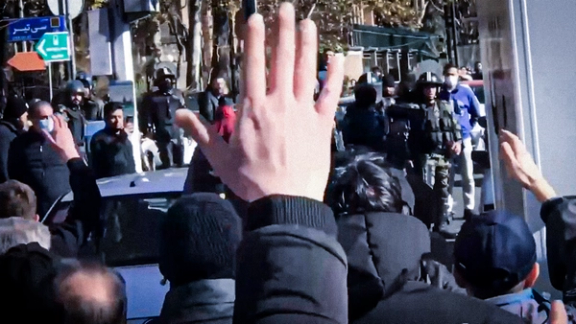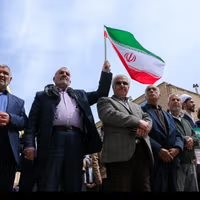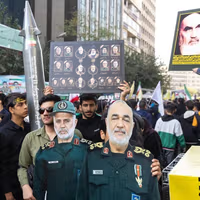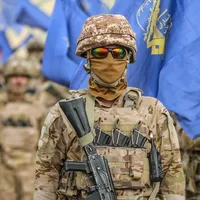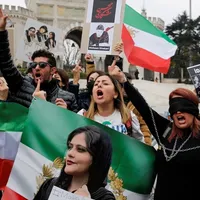Diplomat: US-Iran Contacts In Nuclear Talks Moving More Quickly

Indirect talks between Iran and the United States in Vienna have picked up pace although challenges remain, a Western diplomat told Iran International Wednesday.

Indirect talks between Iran and the United States in Vienna have picked up pace although challenges remain, a Western diplomat told Iran International Wednesday.
While the nuclear talks in Vienna aimed at reviving Iran’s 2015 nuclear deal – the JCPOA, Joint Comprehensive Plan of Action – formally involve remaining JCPOA members and not the US, the central issue in the discussions is squaring the lifting of US sanctions with Tehran curbing its atomic program.
It has been reported that the three western European JCPOA signatories – France, Germany, and the United Kingdom – have been liaising between the formal discussions and the American delegation, which is in Vienna in a separate hotel.
The diplomat, who did not want to be named, said that Iran continued to request a US guarantee that it would not leave the JCPOA once revived, and that Iran specifically would not be satisfied by a verbal guarantee from US President Joe Biden.
According to the diplomat, Tehran had also asked for assurances that Washington would not again impose sanctions that would impede non-American companies from trading with or investing in Iran.
The diplomat said that Iran’s ballistic missile program had not been raised in the talks, which have focused on reviving the JCPOA. Republicans in the US and Israel have been arguing that the US should insist on attaching to the talks a range of demands, including many raised by the administration of president Donald Trump when it left the JCPOA in 2018 and imposed ‘maximum pressure’ sanctions.
When the talks began in April, Biden officials talked of a ‘follow on’ agreement over regional security, but Tehran made clear it was committed to the JCPOA separation of nuclear and other issues, and that it would not make unliteral defense concessions.
Identifying which US sanctions contravene the JCPOA is a major task in the talks. Officials in the Trump administration conceded that many sanctions imposed on other grounds were designed to complicate the task of a successor administration in reviving the agreement.
Since 2018, the US has sanctioned Iranian officials for links to the office of Supreme Leader Ali Khamenei and in 2019 listed Iran’s Revolutionary Guards as a ‘terrorist’ organization.Iran argues that the whole web of US sanctions impedes its ability to trade internationally, although its special concern is US secondary sanctions threatening punitive actions against third parties buying Iran’s oil or dealing with its financial sector.

After intense talks in Vienna for reviving the 2015 nuclear deal more observers in Iran expressed optimism on Wednesday that an agreement might be within reach.
International relations analyst Ali Bigdeli told the Iranian Labour News Agency ILNA that Iran is determined to reach results in the negotiations, adding that Tehran has reduced its expectations to make sure that it can achieve an agreement.
Meanwhile, Foreign policy commentator and former chief of the Iranian parliament's National Security and Foreign Relations Committee, Hershmatollah Falahatpisheh has said in an interview with Fararu news website in Tehran that "there is a higher likelihood for reaching an agreement although it will be difficult."
Falahatpisheh, who sounded more cautious, said that "generally both Iran and the United States are determined to reach an agreement, while some other JCPOA member states try to disrupt a possible deal."
Iran's top officials are silent about the matter but reports on the website of the official news agency IRNA are also optimistic about a positive change in Vienna.
However, both the United States and its three European allies in the talks sounded much more guarded on Tuesday, saying Iran is not negotiating with sufficient speed.
According to Ali Bigdeli, Iran is adamant to make the talks fruitful and has adopted a softer position. He added that that the Iranian negotiating team in Vienna is more concerned about manoeuvres by hardliners in Tehran than being mindful of what the other sides in the negotiations might say about various issues.
Like most commentators who have talked about the Vienna negotiations during the past week, Bigdeli also agreed that indirect talks with the United States has not been constructive and Iran and America should begin to directly speak with each other. He noted that when the Joint Comprehensive Plan of Action (JCPOA) was being hammered out, US secretary of state John Kerry and Iran’s foreign minister Javad Zarif were the ones who met face-to-face and made the final deal.
Bigdeli said that indirect nature of talks with the US and the influence of Iran's hardliners in Tehran are the two factors that have delayed reaching an agreement in the Vienna talks.
However, international and regional developments as well as the economic crisis in Iran make agreement with the United States an urgent matter, he said.
Meanwhile, Falahatpisheh mentioned the interests of other JCPOA member states as another obstacle in the Vienna talks. He said that France is mainly concerned about winning contracts with Arab states in the region rather than being focused on the JCPOA talks. He added that sometimes the French delegates appear to represent Israel rather than France. Falahatpisheh added that even China and Russia look at the Vienna talks and the JCPOA as a means of securing their own interests.
The former lawmaker added that the current situation is the product of Iran's miscalculations. Iran got the Europeans and others involved in the talks because Iran's hardliners had turned direct negotiations with America into a taboo.
In fact, direct negotiations with the United States has been banned by Supreme Leader Ali Khamenei since 2018.
Falahatpisheh said: "I believe Iran and America are enemies, but they are reasonable enough to solve their confrontation through diplomacy rather than by other means." He said that other players in the JCPOA were involved in the talks as mediators, but they follow their own interests rather than seeking to resolve problems between Iran and the United States.
He stressed that what serves Iran's interests is reducing tensions with the `United States.

As the United States State Department expressed caution Tuesday over progress in the Vienna nuclear talks Iranian officials and media said a deal could be near.
"At a minimum, any progress…is falling short of Iran’s accelerating nuclear steps and is far too slow,” spokesman Ned Price said at a press briefing Tuesday. “This can’t continue or it will soon be too late to return to mutual compliance with the JCPOA.”
Responding to remarks by Mikhail Ulyanov, Russia’s lead negotiator in the Vienna talks, detecting "indisputable progress," Price told reporters the US has not seen "sufficient urgency" from Iran: "The last couple rounds [of the Vienna talks] also started with new nuclear provocations and then were characterized by, in some cases, vague, unrealistic, unconstructive positions on the part of Iran."
Iran’s Foreign Minister Hossein Amir-Abdollahian, by contrast, said talks were heading “in a good direction” with agreement “conceivable,” given good will and seriousness, on restoring the 2015 nuclear deal, the JCPOA (Joint Comprehensive Plan of Action).
Wang Qun, China’s lead negotiator in Vienna, shared the Iranian and Russian assessment. Wan told Chinese state television (CCTV) Tuesday that continuing talks between Christmas and the New Year reflected a sense of urgency that had been reflected in "positive results."
In an interview with Foreign Policy magazinepublished Wednesday, Ulyanov said China and Russia had (in the magazine’s words) “persuaded Iran to back away from some of its maximalist positions, including its insistence that the talks focus only on sanctions, not the nuclear issue.”
Foreign Policy added that Ulyanov had said Iran had (again, the magazine’s words) “agreed to begin negotiations on the basis of a draft hammered out by the previous Iranian government [of President Hassan Rouhani] this past spring.”Iran’s new negotiation team, appointed by President Ebrahim Raisi after taking office in August, have said the Vienna talks are based around written proposals they submitted at the beginning of December.
Ulyanov downplayed repeated US, European, and Israeli warnings over Iran stockpiling enough enriched uranium for a bomb. “Even if they produce a significant amount of nuclear material, so what?” he asked Foreign Policy. “It cannot be used without a warhead, and the Iranians do not have warheads.”
In the past 3 weeks, hardliner media outlets in Iran, past critics of the Rouhani administration, have put a positive spin on prospects in Vienna, while media that generally backed Rouhani and the JCPOA have been cautious or pessimistic.
Javan newspaper, which is affiliated to the Revolutionary Guards, has argued that the talks have swung in Iran’s favor since the new team went to Vienna. On Wednesday Javan bore the headline "Possibility of a Deal Before February.”
"Vienna is prepared to finalize a joint compromise over a failed agreement [JCPOA]," Javan wrote, adding that at least two of the 4+1 group of negotiators -- France, Britain, Russia, China, and Germany – have expressed optimism about a deal being possible and close. "And Tehran also maintains a similar perspective."
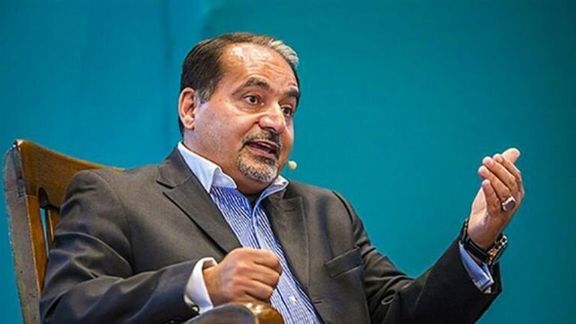
After eighth months of diplomatic attempts to revive the 2015 nuclear deal, Iran is still refusing to sit down with the United States, the main party to the dispute.
The diplomatic process involves the slow and indirect route via the three European countries in the talks, and possibly others, carrying messages back and forth between American and Iranian negotiators.
In an interview published by reformist website Etemad Online on Tuesday, December 28, a former Iranian diplomat and nuclear negotiator Hossein Mousavian has said that the United States might show flexibility on some matters in direct talks.
Mousavian argued that the United States will not give any concessions to Iran through mediators. Direct talks will lead to fewer misunderstandings and a quicker pace in negotiations.
The former diplomat, who lives in the United States and is a visiting scholar at Princeton University, maintained that Iran's decision to hold indirect talks with America is “understandable at this juncture,” but this will delay reaching results. On the other hand, Iran's experience in more than a decade of negotiations with the United States indicates that even if America is prepared to give concessions, it will not do so via mediators.
Elsewhere in the interview, Mousavian revealed that while he was ambassador in Germany in the 1990s, he and other European ambassadors had orders to try to de-couple Western Europe from the United States in matters related to Iran. But he stressed that the strategy of "Europe without America failed," adding that "the United States is much more powerful than Europe, and in fact, the United States is the leader and Europe follows it."
Mousavian asked, " Did Russia, China and Europe fulfil their commitments under the JCPOA after the United States pulled out?" and answered: "No country in the Eastern or Western bloc stood by its commitments under the 2015 nuclear deal."
He also maintained that all countries attach more significance to their ties with the United States than to their relations with Iran. He said, "Other countries are not there to serve Iran's national interests. Instead, they try to serve their own national interests." Why should China cut off its several hundred-billion-dollar economic ties with the United States” when its trade with Iran is a fraction of that?
Meanwhile, Mousavian maintained that no US administration will fully implement the JCPOA. The reason for that is that our problems with the United States are not limited to the nuclear issue. Unfortunately, Iran does not have any powerful lobby in the United States. The Islamic Republic government's ability to use the potential of Iranian-Americans is below zero, Mousavian said. Nonetheless, he stressed that a good agreement could lead to the full implementation of the JCPOA.
He also pointed out that Saudi Arabia and Israel continue to oppose the revival of the JCPOA and want the United States to discuss issues beyond the nuclear issue with the Islamic Republic of Iran.
During the interview, Mousavian repeated recent accusations in Iran’s government-controlled media that France is playing an obstructive role in the negotiations. He even added that in 2014, it was the United States that stopped France when Paris put forward excessive demands.
Expressing his support for direct talks with Washington, Mousavian said: "We reached the same conclusion in the early 2010s and realized that after ten years of negotiations with world powers minus America, we did not get anywhere. And then, after one year of negotiating with America we reached an agreement to which the other five world powers also agreed. We cannot change the history."
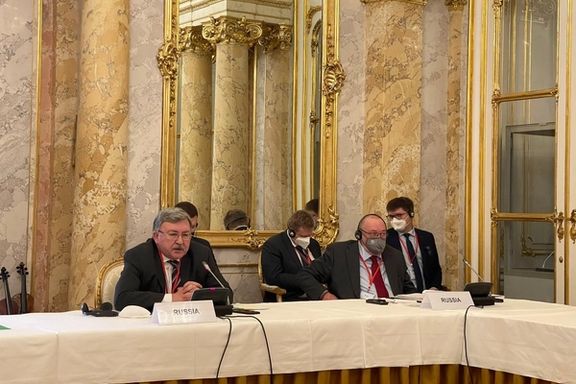
A tweet from Russia’s lead negotiator in the Iran nuclear talks Tuesday found progress in discussion in Vienna over Tehran’s atomic program and US sanctions.
“The working group on nuclear issues held a useful meeting,” Mikhail Ulyanov, Moscow’s ambassador to the International Atomic Energy Agency, tweeted. “We observe indisputable progress. Sanctions lifting is being actively discussed in informal settings.”
‘Informal’ may refer to talks involving the United States, which takes part indirectly in Vienna, where the latest round began Monday after a pause of ten days. The United States left the Iran nuclear deal, the JCPOA (Joint Comprehensive Plan of Action), in 2018 and is outside its formal structures.
E3: Negotiation ‘Urgent’
A more downbeat assessment came from the three western European JCPOA signatories – France, Germany, and the United Kingdom. The ‘E3’ issued a statement Tuesday afternoon suggesting a point was being reached “where Iran’s nuclear escalation will have eliminated substance of JCPOA.”
The statement said that while technical progress had been made in the previous round of talks, there was only “some weeks” rather than months to agree on how to restore the JCPOA. The E3 said it was “not setting [an] artificial deadline for talks.”
The E3 argued that Iran’s expansion of its nuclear program since 2019, breaking JCPOA limits in its level of enrichment and the technology it used, was making the 2015 deal redundant.
"We are clear that we are nearing the point where Iran's escalation…will have completely hollowed out” the JCPOA, the statement said. “The negotiation is urgent − and our teams are here to work swiftly and in good faith towards getting a deal."
Lifting sanctions
Possibly in response to the E3 statement, Iran’s official news agency IRNA reported that technical experts from Iran and other JCPOA parties had been working in Vienna on “mechanisms to verify lifting sanctions against Iran and to minimize the possibility of [another] US withdrawal from the JCPOA [if renewed]."
"The Vienna talks are headed in a good direction," Iranian Minister Amir-Abdollahian said in comments to reporters broadcast by state media. "We believe that if other parties continue the round of talks which just started with good faith, reaching a good agreement for all parties is possible."
Israeli prime minister Neftali Bennett that any nuclear agreement with Iran should be tougher than the JCPOA, which limited Iranian uranium enrichment to 3.67 percent, well below the 60 percent Iran is now achieving.
"We are not the bear who said 'No,'" Bennett told Israel's Army Radio, referring to a character from children's literature. Israel, which holds a considerable nuclear arsenal, has consistently opposed the JCPOA, arguing restrictions on Iran should be tighter, and is widely held responsible for a series of attacks on Iran’s atomic facilities.
"For sure there can be a good agreement,” Bennet said. “For sure. We know the parameters. Is that expected to happen now in the current dynamics? No. Because there needs to be a much firmer position."
Bennett declined to comment specifically on reports that Israel is developing further capacity for attacking Iran, including allocating $1.5 billion. He said he preferred to "speak little and do a lot."
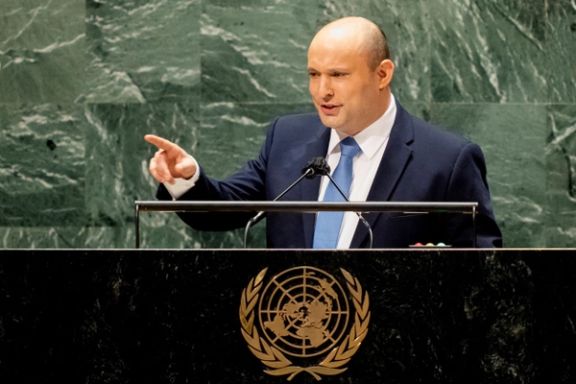
Prime Minister Naftali Bennett said on Tuesday that Israel would not automatically oppose a nuclear deal with Iran but world powers must take a firmer position.
"We are not the bear who said 'no'," Bennett said in an interview with Israel's Army Radio, referring to a popular naysaying character from children's literature.
Israel prefers a more result-oriented approach, he said.
"For sure there can be a good agreement. For sure. We know the parameters. Is that expected to happen now in the current dynamics? No. Because there needs to be a much firmer position," he said.
"Iran is negotiating with a very weak hand. But unfortunately, the world is acting like Iran is at a strong point."
Bennett declined to comment on Israel's military strike capabilities against Iran, saying he preferred the approach of "speak little and do a lot".
On Monday, Iran and the United States resumed indirect talks in Vienna on salvaging the 2015 Iran nuclear deal with Iran focused on one side of the original bargain, lifting sanctions against it, despite what critics see as scant progress on reining in its atomic activities.
Report by Reuters
